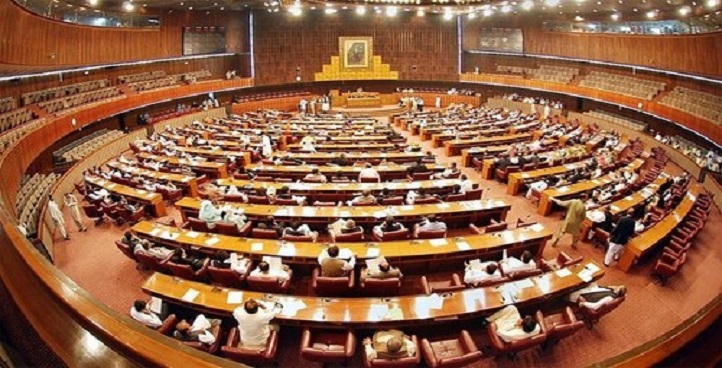

International Day for Judicial Well-being: A Global Call for Action (4 Mar, 2025)
Pakistan Ranks 129 out of 142 in the World Justice Project Rule of Law Index (26 Oct, 2024)
2024 Trafficking in Persons Report: Pakistan (24 June, 2024)
Pakistan ranks second-last in WEF Global Gender Gap Report 2024 (7 Mar, 2025)
Ministry opposes bill to amend procedure of complaints against judges

Wed, December 21, 2016
ISLAMABAD: The mover of a bill to amend the procedure of complaints against judges brought laughter to the participants of a Senate committee meeting when he said the Ministry of Law should not oppose the draft law as it did not relate to the Panama Papers.
The Constitution (Amendment) Bill 2016 was discussed at the meeting of the Senate Standing Committee on Law and Justice chaired by Mohammad Javed Abbasi on Tuesday.
Senator Zaheeruddin Babar, the mover of the bill, tried to convince officials of the ministry of law who opposed the bill. The officials claimed that there was an ‘inbuilt mechanism’ to hear complaints against judges and all the remedies were there in Article 209 which deals with the removal of a judge.
However, Mr Babar said a number of complaints were filed against judges but they were never made public. Judges get salaries three times more than the chief of the army staff but no one can ask about their salaries and assets. A former judge decided to keep a bulletproof car along with 21 security officials but no one could ask about the value of the vehicle.
“During the last 70 years, there were only two examples in which action was taken against judges. One of the two judges was involved in the execution of former prime minister Zulfikar Ali Bhutto. Even that action was taken when the judge was in an exile,” he said.
Officials say there is already a mechanism in Article 209 to hear complaints against judges and even for their removal
Explaining the proposed amendment to Article 209 through the bill, Mr Babar said he had suggested that all complaints filed against judges should be made public.
“The complaints should also be decided within 45 days because a decade is passed but complaints are never decided. The third section which needs to be included is if any person files a false or baseless complaint he should be punished.”
He claimed that the lawyers’ community was also in favour of the bill, so it should be passed to make everyone accountable.
An official of the ministry of law opposed the amendment, saying the law was already there and whenever a complaint was proved against even the chief justice of the Supreme Court or a high court, the next senior-most judge replaces him.
Senator Muzaffar Hussain Shah suggested that an input should be taken from all bar associations before finalising the bill.
The committee decided that the representatives of the bar associations would be called to a meeting and after getting their viewpoints the bill would be finalised.
Civil Courts Amendment Bill 2016 rejected
The committee rejected the Civil Courts (Amendment) Bill 2016 introduced by the government seeking the right of appeal in the civil courts.
The committee members recommended that the right of appeal against any order or decree passed by a civil judge should remain with the high courts.
Senator Babar Awan said people spent years in civil courts so if a case was decided by the civil courts, any of the stakeholders can directly go to the high court concerned instead of filing an appeal with the civil courts.
“If the filing of an appeal is allowed in the civil courts, the citizens will have to spend tens of years in pursuing a case,” he said.
Copyright © 2026 pjn.org.pk








